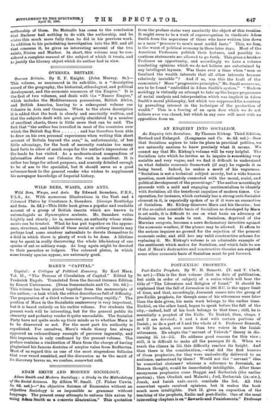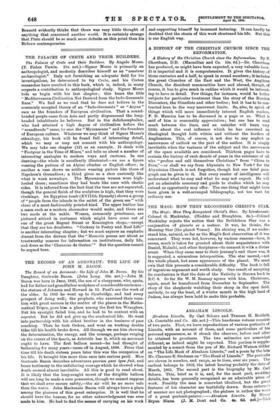POST-EXILIC PROPHETS.
Post-Exilic Prophets. By W. H. Bennett. (T. and T. Clark. Os. net.)—This is the first volume (first in date of publication, but sixth in order of subject) of a, series which will bear the title of "The Literature and Religion of Israel." It should be explained that the fall of Jerusalem in 586 B.C. is the upper limit of time, and that, accordingly, Jeremiah comes into the group of pre-Exilic prophets, for though some of his utterances were later than the date given, his main work belongs to the earlier time. Ezekiel, on the other hand, began to speak before the fall of the city,—indeed, half of his book belongs to that time ; still, be is essentially a prophet of the Exile. To Ezekiel, then, chaps. 1 and 2 are devoted; 3 and 4 deal with certain portions of Isaiah ; so do a part of 5 and the whole of 9. Professor Bennett, it will be noted., sees more than two voices in the Isaiah utterances. He adopts the "servant of Yahweh" theory in dis- cussing lii. 14—liii. He adduces good reasons for this view ; still, it is difficult to make all the passages fit it. When we reach the climax in liii. this difficulty reaches its height. And then there is the coneideration,—what did the first hearers of these prophecies, for they were undoubtedly delivered to an audience, understand by them ? Would not the " servant" idea be somewhat abstruse? whereas a reference to Jeremiah, as Bunsen thought, would be immediately intelligible. After the anonymous prophecies come Haggai and Zechariah (the earlier portion) ; then Obadiah and Malachi ; Joel, Zechariah (ix.-xiv.), Jonah, and Isaiah xxiv.-xxvii. conclude the list. All this somewhat upsets received opinions, but it makes the book much more intelligible. Part IL gives an exposition of the teaching of the prophets, Exilic and poet-Esilio. One of the moat interesting chaptersis OA "Rewards and Punishments." lirofeasqr
Bennett evidently thinks that there was very little thought of anything that concerned another world. It is certainly strange that Plato should be so much more definite on this point than his Hebrew contemporaries.























































 Previous page
Previous page